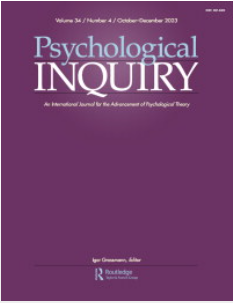个人和社会手段可以(但不必)对立:以社会阶层为例
IF 4.1
2区 心理学
Q1 PSYCHOLOGY, MULTIDISCIPLINARY
引用次数: 0
摘要
自从人类居住在社会群体中以来,人们一直在纠结什么时候该依赖他人或靠自己生活。在很多方面,驾驭这种权衡反映了生活的核心难题之一:我们什么时候应该成为代理人,而不是向他人寻求支持,这些决定会产生什么心理和人际影响?Milyavsky等人(本期)的目标文章为这些问题提供了有力的答案。他们的理论基于这样一种观念,即自力更生和社会支持是追求目标的替代手段。Milyavsky等人(本期)认为,个人的代理意识越强,他们寻求社会援助的可能性就越小,贬低社会关系的可能性也就越大。相比之下,越是依赖社会支持的人,他们成为代理人的动机就越弱,他们关注自我和优先考虑自我的倾向就越小,他们对他人的关注度也就越高。Milyavsky等人(本期)的观点有很多值得喜欢的地方。他们的理论是令人信服的,首先也是最重要的,因为它的吝啬;将自我和其他依赖视为水力的、决斗的动机是有吸引力的,也是直截了当的。其次,他们的理论在解释范围上令人印象深刻:Milyavsky等人(本期)在一系列领域整理了各种各样的经验证据,以证实他们的主张。第三,我们了解到他们的理论不同于其他相关理论,并提供了高于其他相关理论的价值,最显著的是代理和交流之间的对比。最后,他们的理论通过概述一系列开放和有趣的问题而具有经验生成性,这些问题应该为未来几年对目标追求的补偿模式进行强有力的科学研究奠定基础。追求目标的个人手段和社会手段代表着动机连续体的决斗终点,这一观点在其他心理学文献中也有相似之处。例如,在社会归因的研究中,对社会行为的倾向性或个人解释经常被视为——并且根据经验发现——与情境或环境解释有液压关系。随着对特定个人结果(如贫困)的倾向性解释(如懒惰)的增加,对同一结果的情境性解释(例如结构性不公平)往往会减少,反之亦然(Hunt&Bullock,2016;克劳斯、皮夫和凯尔特纳,2009年;皮夫等人,2020)。同样,在无数的社会背景下,包括在对社会阶层心理影响的研究中,都可以观察到自我和其他依赖呈负相关的基本动态(例如,Dietze&Knowles,20162021;Piff,2014;Piff、Kraus、Côt e、Cheng和Keltner,2010,Piff、克劳斯和Keltna,2018)。与此同时,正如归因研究中的一些研究结果所表明的那样,倾向性解释和个人解释并不总是相反相关的,有时甚至可以相互呈正相关(例如,见Piff et al.,2020)——社会阶层的心理学研究指向的是追求目标的社会手段不一定竞争的环境与私人的。事实上,在某些情况下,这两种动机可能同时起作用,相互加强。在这篇评论中,我们将详细说明个人能动性的差异,源于与不同社会阶级群体相关的资源生态的不平等,如何导致自我关注与关注他人的阶级差异。我们回顾了这些阶级差异是如何在一系列社会结果中表现出来的,包括对自我的评价(例如,Piff,2014;Twenge&Campbell,2002)、对他人的关注(例如,Dietze&Knowles,2016)、情绪反应(例如,Ditze&Knols,2021;Piff&Moskowitz,2018;Stellar、Manzo、Kraus和Keltner,2012)和亲社会性(Piff等人,2010;Piff&Robinson,2017)。这些实证研究结果有力地证明了目标文章的总体框架:追求目标的社会模式可能是对个人能动性减少的补偿反应。然而,社会阶层文献中的一些研究结果也指出,社会支持实际上可能促进而不是破坏个人能动性。我们在综述中讨论了两个这样的案例,以指出Milyavsky及其同事的理论的一些潜在边界条件。最后,我们警告不要将自我和其他焦点单方面概念化为决斗动机,也不要将通常需要人(或认为不需要人)的人视为必然需要人的社会分类法。本文章由计算机程序翻译,如有差异,请以英文原文为准。
Personal and Social Means Can Be (But Need Not Be) Opposing: The Case of Social Class
Since humans have inhabited social groups, people have grappled with when to rely on others or get by on their own. In many ways, navigating this trade-off reflects one of the central conundrums of living: When should we be agentic versus turn to others for support, and what are the psychological and interpersonal ramifications of these decisions? The target article of Milyavsky et al. (this issue) offers a powerful answer to these questions. Their theory is grounded in the notion that self-reliance and social support represent alternative means of goal pursuit. The stronger the individual’s sense of personal agency, Milyavsky et al. (this issue) reason, the less likely they are to seek social assistance and the more likely they are to devalue social relationships. By contrast, the more individuals rely on social support, the weaker their motivation to be agentic, the lesser their tendency to focus on and prioritize the self, and the more attentive they become to others. There is much to like about what Milyavsky et al. (this issue) lay out. Their theory is compelling, first and foremost, in its parsimony; treating selfand other-reliance as hydraulic, dueling motivations is appealing and straightforward. Second, their theory is impressive in its explanatory range: Milyavsky et al. (this issue) marshal a varied assortment of empirical evidence across a sweeping array of domains to substantiate their claims. Third, we learn their theory is distinct from and provides value above other related theorizing, most notably on the contrast between agency and communion. Finally, their theory is empirically generative by outlining a range of open and interesting questions that should set the stage for a robust scientific inquiry into compensatory modes of goal pursuit for years to come. The notion that personal means and social means of goal pursuit represent dueling ends of a motivational continuum finds parallels in other psychological literatures. In research on social attribution, for example, dispositional or individual explanations for social behavior are frequently treated as––and empirically found to be––hydraulically related to situational or environmental explanations. As dispositional explanations (e.g., laziness) for a particular individual outcome (e.g., poverty) increase, situational explanations (e.g., structural unfairness) for that same outcome tend to decrease, and vice versa (Hunt & Bullock, 2016; Kraus, Piff, & Keltner, 2009; Piff et al., 2020). Similarly, the basic dynamic that selfand other-reliance are inversely related can be observed across myriad social contexts, including in research on the psychological ramifications of social class (e.g., Dietze & Knowles, 2016, 2021; Piff, 2014; Piff, Kraus, Côt e, Cheng, & Keltner, 2010, Piff, Kraus, & Keltner, 2018). At the same time––and as is the case with select findings in attribution research showing that dispositional and individual explanations are not always inversely related but can even sometimes be positively related to one another (e.g., see Piff et al., 2020)––the psychological study of social class points toward contexts in which social means of goal pursuit may not necessarily compete with personal ones. Indeed, there may be situations in which these two motivations operate in tandem to mutually reinforce one another. In this commentary, we will detail how differentials in personal agency, stemming from the inequalities in resource ecologies associated with different social class groups, give rise to class differences in self-focus versus attentiveness to others. We review how these class differences play out across an array of social outcomes, including evaluations of the self (e.g., Piff, 2014; Twenge & Campbell, 2002), attentiveness to others (e.g., Dietze & Knowles, 2016), emotional responding (e.g., Dietze & Knowles, 2021; Piff & Moskowitz, 2018; Stellar, Manzo, Kraus, & Keltner, 2012), and prosociality (Piff et al., 2010; Piff & Robinson, 2017). These empirical findings provide a compelling demonstration of the overarching framework of the target article: Social modes of goal pursuit can arise as a compensatory response to reduced personal agency. However, select findings in the social class literature also point toward instances in which social support may actually facilitate a sense of personal agency rather than undermine it. We discuss two such cases in our review to point toward some potential boundary conditions to the theory of Milyavsky and colleagues. We conclude by cautioning against both a unilateral conceptualization of selfand other-focus as dueling motivations and a social taxonomy that renders people who typically need people (or who think they do not) as necessarily being so.
求助全文
通过发布文献求助,成功后即可免费获取论文全文。
去求助
来源期刊

Psychological Inquiry
PSYCHOLOGY, MULTIDISCIPLINARY-
CiteScore
10.30
自引率
1.10%
发文量
31
期刊介绍:
Psychological Inquiry serves as an international journal dedicated to the advancement of psychological theory. Each edition features an extensive target article exploring a controversial or provocative topic, accompanied by peer commentaries and a response from the target author(s). Proposals for target articles must be submitted using the Target Article Proposal Form, and only approved proposals undergo peer review by at least three reviewers. Authors are invited to submit their full articles after the proposal has received approval from the Editor.
 求助内容:
求助内容: 应助结果提醒方式:
应助结果提醒方式:


